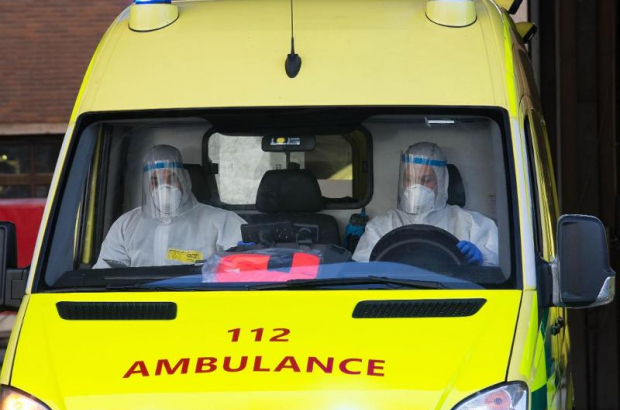- Daily & Weekly newsletters
- Buy & download The Bulletin
- Comment on our articles
Coronavirus in Belgium: Behind the masks of some of the country’s frontline workers – Part 2
In the second of a series reporting on Belgium’s frontline workers, the Bulletin talks to some of the people braving the Covid-19 pandemic. From an emergency responder and dentist to supermarket and healthcare staff, these key workers are struggling to contain the virus with often limited resources.
The firefighter and paramedic
As a professional fireman, technical diver and paramedic, Jean Pichon is convinced that not focusing on the coronavirus is one of the vital aspects of his job. If the usual emergencies have decreased due to the stay-at-home measures, “the population continue to need us for a fire, a person in the water or a heart attack”. An equal priority, “is being vigilant when treating a potentially-infected person, to not miss another pathology”, he adds.
At the fire and rescue service where he works in Namur, there’s been progressive re-organisation with strict physical distancing maintained, even at the station. The continual need to update safety measures is demanding. “It’s quite hard because you have to adapt constantly, without becoming neurotic either, while being as effective as possible based on what you know day by day. It has always been said that a firefighter needs to be adaptable ... today that’s even more obvious.
“We wear surgical masks for the whole of the shift, ‘clean down’ the ambulances after each shout and disinfect everything in the barracks several times a day. At the end of the shift, you take off your mask after the umpteenth disinfection and go home. We fear a bit for our family, but we know that this is part of the job and it has to be done.”
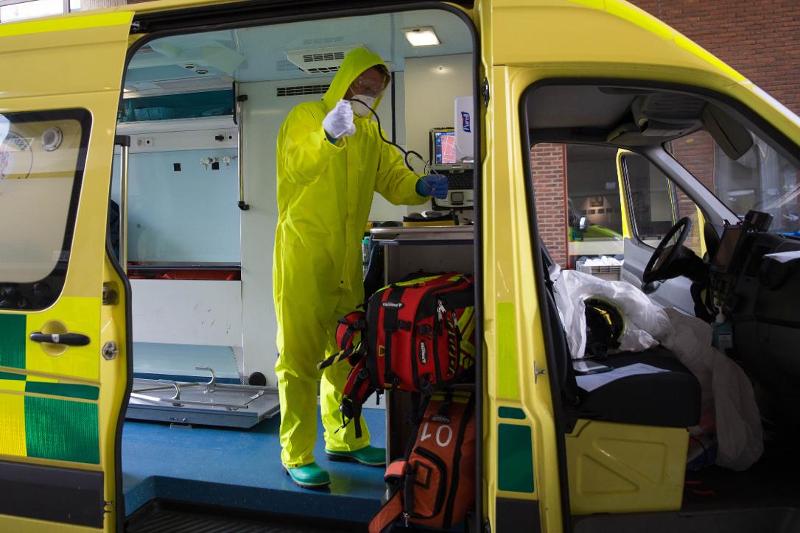
Precaution is a key measure for ambulance interventions, he says. “If we are sick or infected, not only could we spread the virus but we could weaken the first aid capacity in our region.” Pichon and his colleagues manage day-by-day with the minimum of equipment. “I think nothing at the federal level had been adequately prepared, and fire officials have had to do their best to try to protect the personnel.”
How difficult is it to maintain morale? “Fears for your family and loved ones are inevitable. A firefighter's day also influences his mood. Seeing the difficulties and the dramas in retirement homes, feeling the tension in hospital services close to saturation, then sometimes finding yourself facing some thoughtless people who seem to think they are on vacation by cycling in large groups, that can make you feel empty. Fortunately, we also see beautiful things.”
Does he have a message for the public concerning the measures? “Today, everyone is a virologist or political experts on social networks. People should stop relaying everything and anything. Misinformation, extremism and insane ideas will end up killing more people than the virus itself! Everyone can have their own opinion, but in such a situation, you have to let everyone do their job. The only thing that effectively combats this scourge is unity.
“The way this pandemic has put us, and will put us to the test for a while, will have to generate deep reflections on our work: the specialisation of paramedics, preparation, risk recognition, protection of the most vulnerable … but this challenge will be for later, when many lessons have yet to be learned.”
The dentist
Mark Willems shares a dental practice with three colleagues in Destelbergen, near Ghent. “When the pandemic broke out, we quickly made the necessary adjustments to still help people with dental complications that cannot wait,” he says. At least one dentist and one assistant is present in the practice, while colleagues inform people over the phone.
“We see about three patients per day, often people who have been walking around with problems for a long time and as a result suffer extreme pain. In many cases, all we can do is to remove the affected tooth. It’s sad, we possess all this know-how to prevent issues and have advanced technology to tackle specific issues, but we now just operate in ‘emergency mode’ – like I imagine is often the case in developing countries.
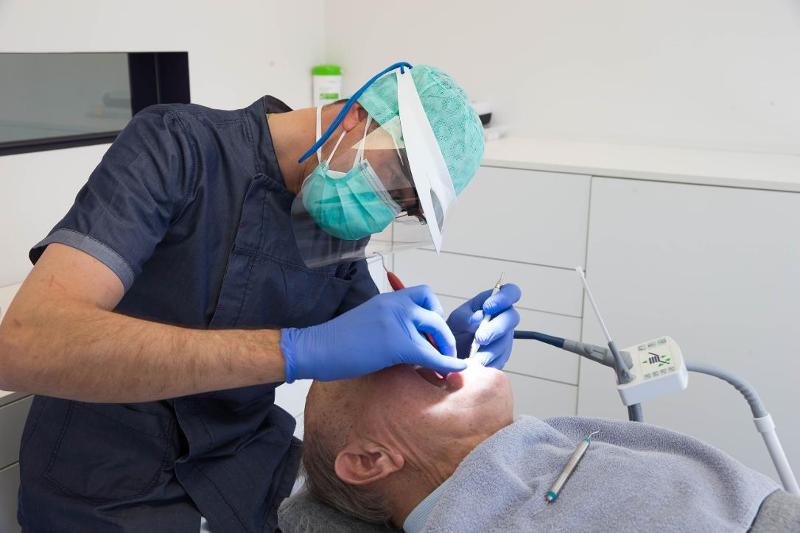
“Of course, we follow very stringent guidelines to assure the safety of patients and ourselves. We have to wear a suit that makes us look like astronauts and we need to clean and ventilate treatment rooms very thoroughly after appointments. These measures are vital, because our work exposes us to an enormous number of air particles that come from a patient’s mouth and can carry the coronavirus.
Willems says the current conditions doesn’t scare him, although he admits the situation is stressful. But he is worried about the aftermath of the pandemic. “I’m afraid we will be flooded with demands, as we cannot focus on prevention at the moment. It’s also not economically feasible to continue working with these safety measures, which make treatments last much longer than usual, without financial adjustments.”
The supermarket worker
Belgium’s supermarket employees were the first to notice that a crisis was coming when customers began to stockpile groceries – pasta, flour, toilet paper. The situation escalated when it was announced that people should only leave home for essential errands. “You can clearly see that people are buying up the same products over and over,” says Justynka, a Delhaize employee in Ghent. “We can’t keep up, but little by little, we always get there.”
As Justynka has what the government calls an essential job, she must work through the coronavirus crisis. But she isn’t unhappy about it. “I’m not scared to go to work, and I’m grateful that I feel financially stable during this difficult period,” she says.
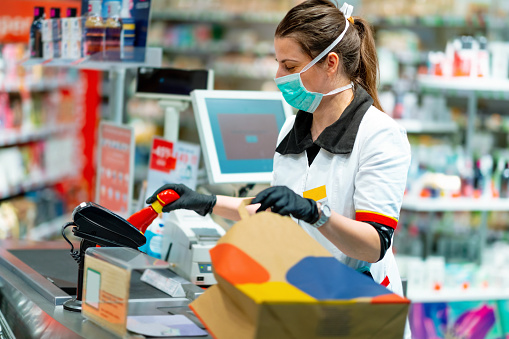
Justynka works in the bakery department and on the cash register. She admits that it’s impossible for employees in such small quarters as the bakery to remain 1.5 metres from each other at all times. But that’s not her biggest concern. The customers get that honour.
“Not everyone sticks to the measures; they don’t always respect social distancing,” she says. “They should really look around before heading in a certain direction rather than just passing someone by” like in normal circumstances. She does notice that a lot of customers are wearing facemasks and gloves, which she appreciates.
While supermarkets implemented measures here and there as the days wore on, Justynka says she now feels like Delhaize is doing its best to protect the staff. “The cashiers are now working behind Plexiglas,” she says, “and only one person per shift is allowed at any particular register, so that helps to distance us. We also all have disinfectant gel at hand, and there’s plenty of information about safety measures across the work floor. But we only got facemasks last week.”
Delhaize has definitely stepped up, getting much more thorough about hygiene recently, says Justynka. “They are basically doing everything they can to respect the measures. It’s unfortunately the customers who aren’t being careful.”
The emergency nurse
Catherine Guebs is an emergency nurse and part of the paramedic intervention team at CHR Namur. In response to the coronavirus, teams have been reinforced and her department has been extended and divided into two parts, clean and infected. “So there are isolation rooms and we work on one side or the other,” she explains. Other measures include permanently wearing a mask and complete personal protection equipment when working in isolation units.
“A medical triage is done when people enter the emergency unit. If necessary, people are isolated on the ‘infected’ side. We must always work with protection and each emergency room has become a special room. We no longer have a traditional temporary hospitalisation service in the department,” she says.
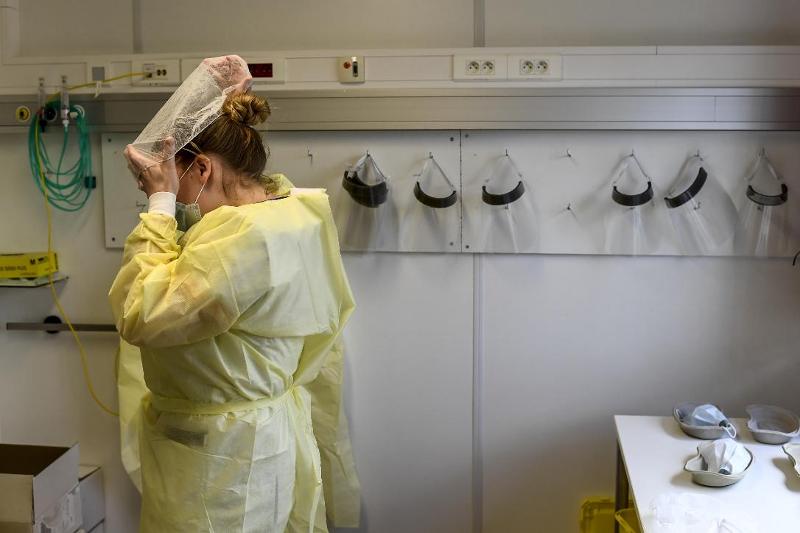
Guebs highlights a few of the challenges: “Working under stress and interrogation, having to think about every detail before entering isolation units, paying particular attention to asepsis, keeping in mind other classic emergency problems …”
Understandably, the atmosphere at the hospital is tense. “Even if there’s great collaboration and cohesion within the team, there are many questions about the future, the duration of the crisis, the fear that services will be saturated, the consequences of easing the coronavirus restrictions and the difficulty when each service returns to normal but with less resources,” she says.
While Guebs advises the public to stay at home and respect hygiene standards - hand washing, wearing a mask - she warns people not to neglect other health concerns: “Seek treatment. Despite Covid-19, some issues need to be addressed quickly. People are so afraid of catching the virus in the emergency department, they no longer dare to come forward for other problems. This could have serious consequences.”
As Guebs has regularly been in contact with infected patients, does she worry about catching it herself or passing it on to her family? “Yes, but not to the point of losing sleep, although it does remain a worry.”
Photos: Brussels fire brigade©Nicolas Maeterlinck/Belga; Brussels fire brigade cleaning ambulance©Nicolas Maeterlinck/Belga; Dentist cabinet Gavere©Nicolas Maeterlinck/Belga; Getty Images; Dirk Waem/Belga
Behind the masks of some of the country's frontline workers - Part 1












